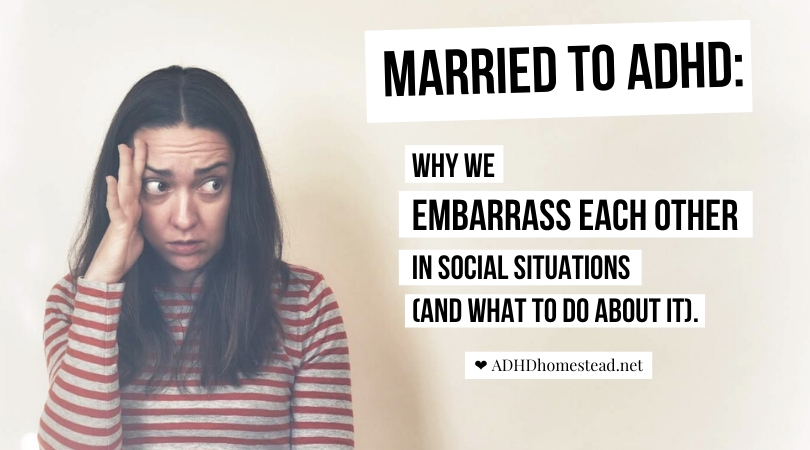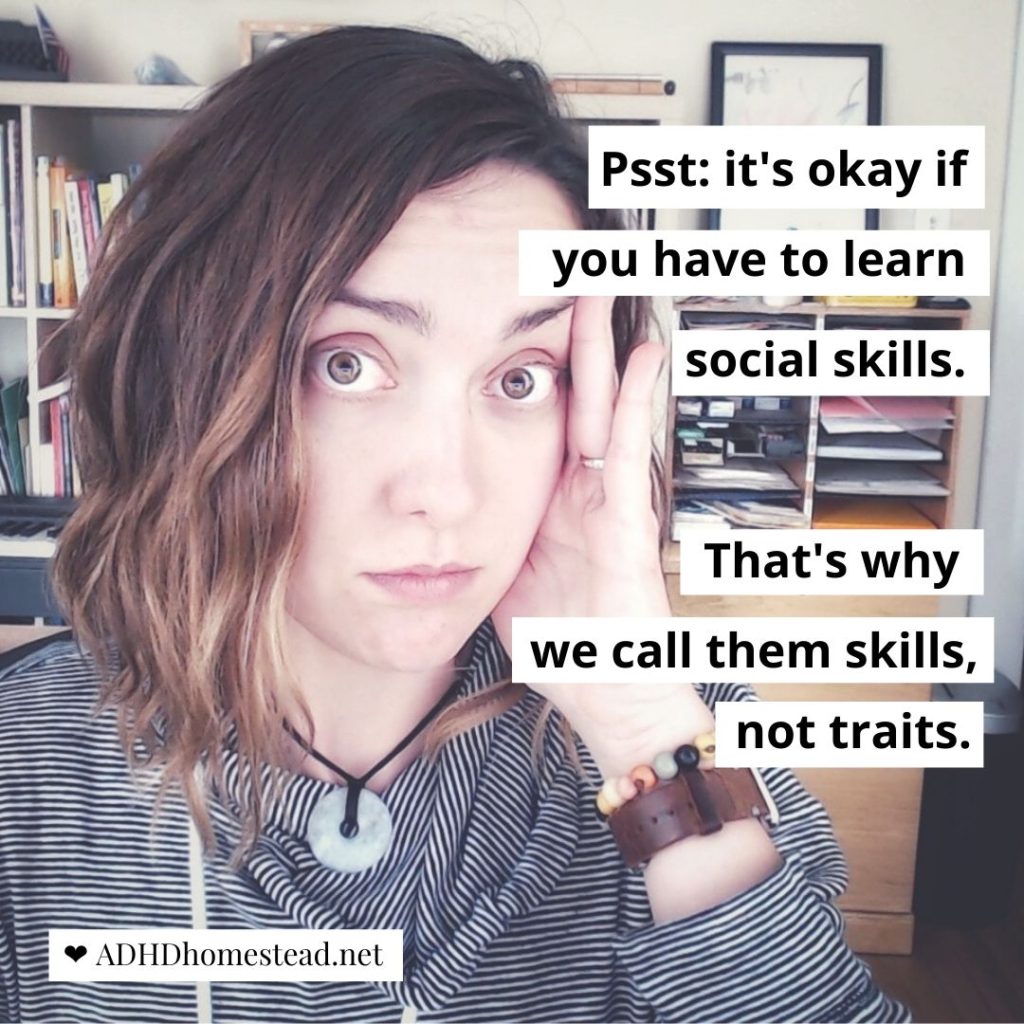Editor’s note: an older version of this post first appeared on December 19, 2018.
We ADHDers often don’t realize we’re making a scene until it’s too late. This can both infuriate and embarrass our partners. Other couples look like the perfect team at social functions. They send signals on their own frequency and they save each other from discomfort rather than tossing each other under the bus. Why oh why, we wonder, can’t we be more like them?
Rather than beat ourselves up for failing to become someone we’re not, we need to learn our own version of the social game. For example: subtle unspoken cues often elude us. Social skills that seem to come naturally to others may require learning and practice.
We also need to develop those signals: discreet ways to throw a flag on the field and alert each other to bad ADHD behavior.

Why are partners with ADHD such a social liability?
Distraction, impulsivity, and stimulation-seeking behaviors turn us into walking time bombs at social events. Interactions between mature adults often require attentiveness, self-awareness, and restraint. We may even assume these qualities define adulthood, as if we all grow into them naturally. However, these are skills, not traits. Many ADHDers don’t just grow into them.
Sometimes we forget subtlety exists…
For whatever reason, many ADHDers are oblivious to unspoken social cues. This may come from distraction, hyperfocus, or a combination of the two. We get so wrapped up in what we’re thinking or saying, we completely forget to “read the room.”
Socializing also requires a lot of focus. I get so flustered trying to manage Basic Conversation Stuff — i.e. talking and listening — that I forget to stop and assess others’ reactions to me. When we ignore clues like body language, facial expressions, or passive verbal hints, we risk snowballing a social faux pas. For the partner standing next to us receiving those signals loud and clear, this can be mortifying.
…but other times, we self-medicate our way out of boredom.
Grown-up social events can be understimulating or just flat-out boring for ADHDers. When we feel understimulated, we tend to self-medicate. Alcohol, conflict, and inappropriate behavior give our brains a little dopamine boost. Unfortunately, it often comes at someone else’s expense.
For example: before his ADHD diagnosis, my husband made a sport of embarrassing me in front of other people. When I inevitably got upset about his inappropriate insults and oversharing, he accused me of lacking a sense of humor. (To be clear: this behavior totally belies my husband’s true character. Since being diagnosed with ADHD and starting meds, he no longer does this at all and he feels pretty bad about his past behavior.)
Many people think ADHD medications help us focus at work or school, and we don’t need them during the so-called off hours. Untrue. These medications raise our brain’s baseline level of stimulation. Raising that baseline does help us get our work done, but it also supports appropriate social behavior.
And I don’t mean soulless conformity. I mean behavior that aligns with our own values and desires. For me this means treating others with respect, consideration, and empathy. It means talking to add value to the conversation, rather than as a way to fidget. Whether or not you take medication for ADHD, it’s important to learn how self-medicating behaviors can impact our relationships.
We need to take responsibility for our ADHD’s impact on social situations.
I’ve heard it before and you probably have, too: ADHDers are the life of the party, right?
Well, sometimes. Some of us get a reputation for being fun or carefree. Personally, I’ve always skewed more toward anxious and overwhelmed, but I get it. People with ADHD, especially the more extroverted among us, can really get the party started.
This can become less appealing the farther we get into adulthood. Behaviors that may have seemed cute or funny or brazen in our early 20s can seem hurtful, immature, or obnoxious later in life. Others expect to be able to rely on us as co-parents, spouses, and professionals. And we expect our fellow adults to take us seriously.
In other words, we hit a point where we need to reign it in. Spotty self-awareness and low impulse control can make it tough to reign it in on our own. This is where a spouse (or a trusted wingman/lady) can help us fake it ‘til we make it.
Flag on the field: let your partner alert you to bad behavior

The person standing beside you can be your best social ally. They’ll see things you miss and help you learn to recognize when you’re doing That Thing™️ again. I recommend a clear signal — something only the two of you will understand — to alert you to problem behaviors. Here are a few tips I’ve learned over the years:
- Make sure help is both offered and accepted.
Emotional baggage from late diagnoses and past social failures can make us hypersensitive to criticism. We often perceive it as rejection, especially coming from a romantic partner. You can’t force someone to accept your help or advice. The ADHDer must both agree the behavior is a problem and express a desire for you to help point it out. - Make it explicit and intentional (don’t leave any room for doubt).
My husband spent years elbowing me or kicking me under the table only to have me halt the conversation by yelling, “what!?” The impairments that put us in social hot water in the first place make us unlikely to catch your subtle hints about it. Agree on your signal beforehand. Make it specific and easily recognizable. You may even want to practice at home with just the two of you. - Use humor when you can.
Years ago, something provoked me during dinner with my husband. I pounded my fist on the table so hard, several months’ worth of crumbs ejected from the crack where the leaves join together. After a tense silence, we both laughed until our sides hurt. For a long time after that, my husband would give me a meaningful look and bring a fist down on his open palm to let me know when I was overreacting. The funny memory always helped deescalate the situation. - Work on one thing at a time.
Don’t create an entire sign language vocabulary to flag every problem that’s ever made you roll your eyes. In addition to making us feel like we can’t do anything right, most ADHDers can’t keep that many things in our head at once. We’ll get overwhelmed and it’ll all go out the window. Choose one priority — say, oversharing, loud talking, or overstaying one’s welcome at dinner parties — and use your signal to help develop self-awareness around that. When you’ve experienced some success, leverage that new confidence to address the next priority. - Check egos at the door.
If we want to fix the problems ADHD has created in our adult lives, we need to get realistic with ourselves. ADHD affects our behavior and our perceptions. While it might sometimes hurt to have someone point that out, we have to learn to accept help and support. - Be compassionate.
By that same token, never use a signal to scold or criticize. Use it to help and support. A perceived personal attack will put the other person on the defensive and degrade their trust in you. Not only that — and I admit this is my personal opinion here — contempt is perhaps the worst toxin you can introduce to a marriage. Avoid it at all costs.

Please join the conversation in the comments! Have you and your partner tried signals to help derail bad behavior? How do you send a message without making things worse?
Hey there! Are you enjoying The ADHD Homestead?
Here's the thing: I don't like ads. I don't want to sell your attention to an advertising service run by the world's biggest data mining company. I also value my integrity and my readers' trust above all, which means I accept very few sponsorships/partnerships.
So I'm asking for your support directly. For the cost of one cup of coffee, you can help keep this site unbiased and ad-free.
Below you will find two buttons. The first lets you join our crew of Patreon pals and pledge monthly support for my work. Patrons also have access to my Audioblogs podcast. The second takes you to a simple donation page to pledge one-time or recurring support for The ADHD Homestead, no frills, no strings. Do whichever feels best for you!
